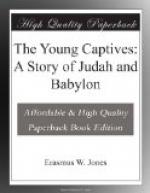In two years after these occurrences Darius the Mede died; and about the same time died also Cambyses, the father of Cyrus, in Persia. Cyrus, therefore, returned to Babylon, and took upon himself the government of the empire.
The history of the lions’ den, with all the intrigues that led to it, made Daniel thrice dear to the inhabitants of Babylon. His name commanded reverence wherever it was mentioned, He was looked upon as an angel of mercy, goodness, and wisdom, sent by the gods to bless the race.
Cyrus, for a long time, had desired the opportunity of a prolonged interview with Daniel, of whom he had heard so many wonderful things, both as a minister to the king of Babylon and also while administering the affairs of the kingdom under the reign of his Median uncle. The Persian was already well versed in current history. Of the God of Israel he had heard much of late, and he felt a strong inclination to hear more. And of whom could he learn to better advantage than of the famous Hebrew prophet? The celebrated Persian, from his infancy, had been taught to worship and adore the imaginary gods of his own country; but he had always felt doubtful in regard to the existence of these gods; and many of the popular theories of Persia, in regard to their various deities, were, to him, full of inconsistencies and contradictions.
Not many days after his arrival in Babylon, the royal chariot was seen to halt at the door of Daniel’s residence; and, moreover, the king himself was seen to enter.
“Thou wilt pardon this sudden intrusion,” said Cyrus; “I have long desired an interview with the president, and for this purpose I have entered his house; the king is happy to find that he is not absent.”
“My lord the king hath greatly honored his unworthy servant by entering under his roof,” said the old Hebrew. “This condescension of the great Persian conqueror is a favor of such a magnitude that it shall never be forgotten.”
“Let not my aged friend Daniel speak thus,” said the king, in a friendly manner. “Call it not condescension in Cyrus to seek the society of one who has justly earned the reputation of being the most profound statesman that ever moved among mortals. Let the king rather consider himself honored in being permitted to listen to thy words of wisdom and understanding.”
“Humility becometh well the potentates of earth. But yet, O king, thou beholdest not the real grandeur of thy mission. Thou knowest not that thou art the peculiarly anointed—not of the gods, but of the only God of heaven, the Almighty Jehovah, the God of Israel, to pour his wrath upon the nations, and to restore the children of Judah to their own land.”
“Thou hast touched a theme on which, above all others, at this time, the king would choose to dwell. Of the gods I have but an imperfect knowledge. Conscious am I that under the particular direction of some invisible power I have been led forward in all my movements, from my youth up. I was taught to worship the gods in my juvenile days; but ever since I arrived at years of thought and judgment, my mind has been greatly perplexed by what seemeth to me to be glaring inconsistencies in our theory of religion.”




